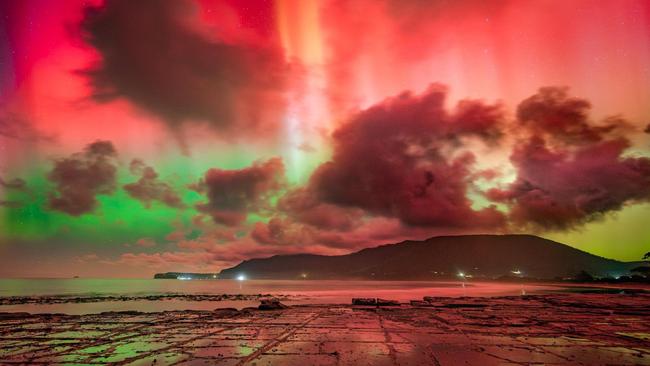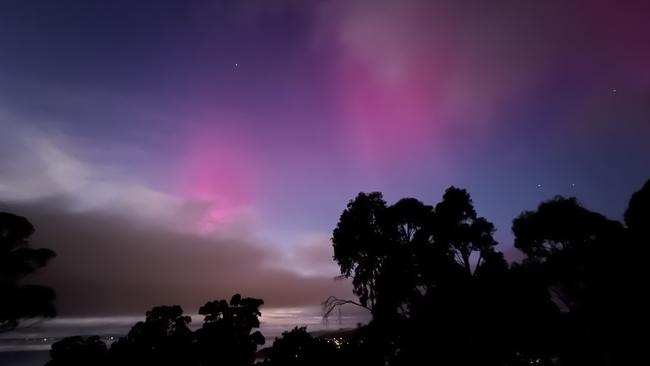Stunning, rare Aurora lights up Tasmania’s skies captivating visitors and locals alike
Photographer Sean O’ Riordan knew it was a risk making a quick trip down to Tasmania to snap the rare Aurora, and he wasn’t left disappointed. How to catch an Aurora >>

Tasmania
Don't miss out on the headlines from Tasmania. Followed categories will be added to My News.
Tasmania’s stunning, yet difficult to capture, Aurora is on the bucket list of many photographers, including Sean O’ Riordan who made the risky decision to visit the state on the hope of snapping one.
Luckily, he was one of many who were left stunned by the lights in the sky.
The Bureau of Meteorology had issued a G4 geomagnetic storm on Friday to arrive around 8pm, which can result in bright Auroras being visible at unusually low latitudes.
With an “incredible” Aurora forecast, Mr O’ Riordan said they didn’t know exactly when it would hit.
“I was thrilled that it hit early as I’m leaving Tassie today,” Mr O’ Riordan said.
“Usually we don’t want clouds but these almost added more drama to the image.”
Driving down in a camper van to Eaglehawk Neck and parking up at the Tessellated Pavement around 10.30pm, he said they waited until his phone buzzed with the Aurora alert around 3.15am on Saturday.
“Any chance I get to capture night skies I take however Aurora is so rare,” he said.
“I have photographed the northern lights in Ireland so it was on my bucket list to capture the Southern Aurora. Now I can say I captured the Aurora in both hemispheres.”
Originally from Ireland and living in Australia since last October, the photographer said he had been chasing Auroras for around five year and had only shot it a handful of times.
“So many variables have to line up and you need a lot of luck too!”
The Aurora was visible from just after 3am right through to around 6.30am with social media flooded with photos from early risers. Many of them popping up on Facebook in the Aurora Australis Tasmania group.
Hope it will return
The Bureau predicts the same geomagnetic conditions are likely to continue through to Sunday morning, however slightly reduced.

It forecasts an Aurora may be observed during the night time hours in good observing conditions at high latitudes.
“Bright Auroras usually last for 1–3 hours and the best viewing time is around midnight — between 10pm and 2am,” the Bureau said.
“However, there’s no magic hour that you’re guaranteed to see Auroras — keen Aurora chasers usually keep an eye on our real-time geomagnetic indices which show the level of geomagnetic activity.”
Tips on how to take a photograph of an Aurora and alerts can be found on the Aurora Australis Tasmania Facebook.


